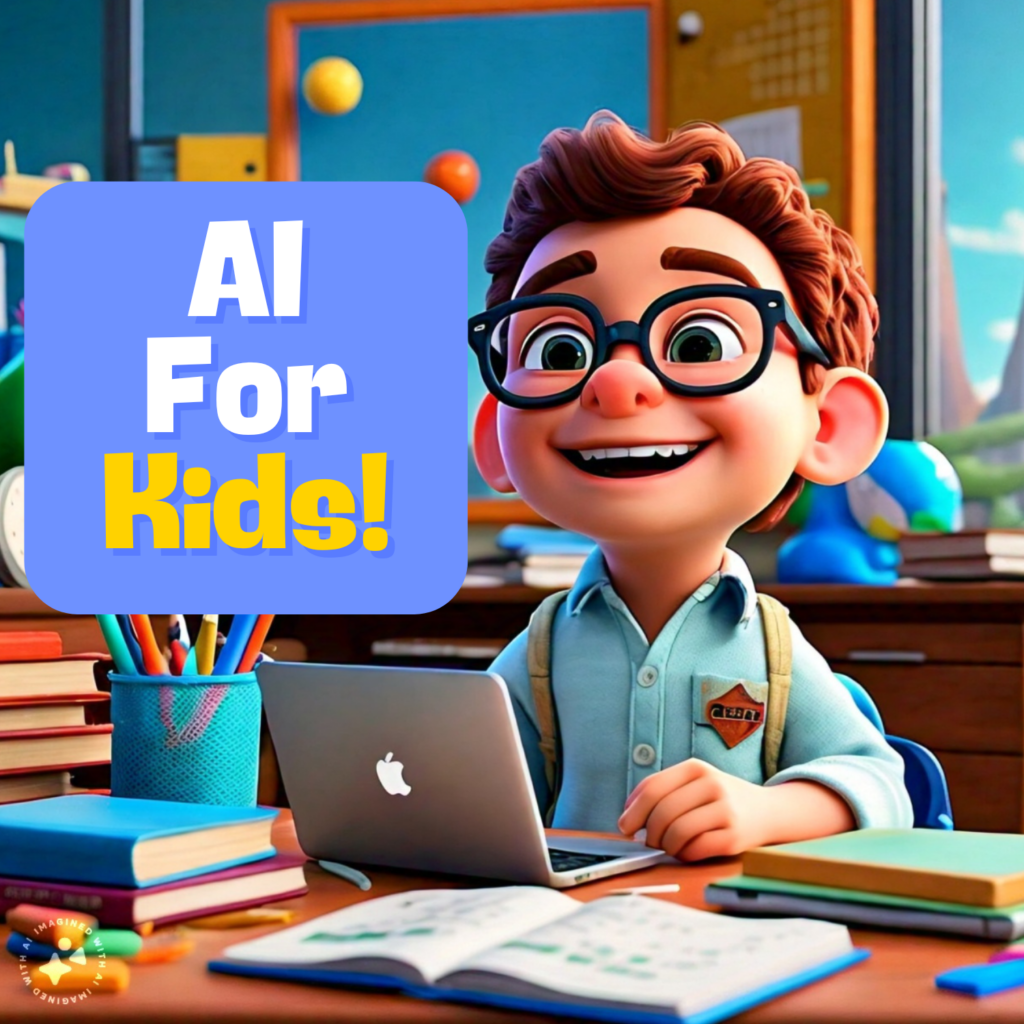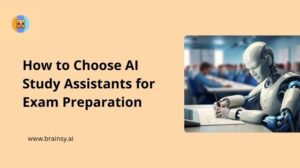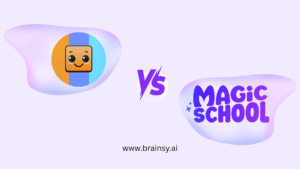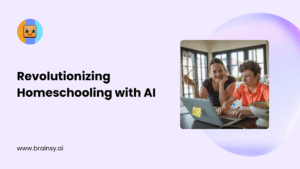Unlocking the Power of AI Learning for Kids
Let’s explore AI for kids! Artificial intelligence (AI), once a sci-fi concept, is now pivotal in everyday life. AI appears in virtual assistants, self-driving cars, and more. Particularly, AI’s role in child education shows great potential
In this article, discover how AI for kids enhances learning, explores its potential, and shapes educational futures in schools and homes. Join us to see how AI empowers the next generation.
The Benefits of AI Learning for Children
- Personalized Learning Experience: AI algorithms can analyze a child’s learning patterns, strengths, and weaknesses, tailoring the educational content and delivery methods to their unique needs. This personalized approach ensures that each child receives targeted support, maximizing their learning potential.
- Adaptive and Engaging Content: AI-powered educational tools can adapt to a child’s progress, providing challenging yet achievable tasks that maintain their interest and motivation. Interactive and immersive experiences like virtual reality simulations can make learning more engaging and enjoyable.
- Instant Feedback and Assessment: AI systems can provide real-time feedback and assessments, allowing children to identify areas for improvement and receive immediate guidance. This instantaneous feedback loop accelerates the learning process and fosters a growth mindset.
- Accessibility and Inclusivity: AI-driven educational platforms can cater to diverse learning styles and abilities, ensuring no child is left behind. Children with special needs or learning disabilities can benefit from tailored support and assistive technologies powered by AI.
How AI Transforms Kids’ Education
Developing Problem-Solving Skills with AI Simulations
The integration of AI into the educational landscape for children has the potential to revolutionize the way they learn and prepare for the future. By embracing AI technology, we can equip the next generation with the skills and knowledge necessary to thrive in an increasingly digitized world.
Personalized Learning with AI Technology
One of the most significant impacts of AI on kids is the fostering of critical thinking and problem-solving abilities. AI-powered simulations and interactive scenarios can present children with complex challenges, encouraging them to develop analytical and creative problem-solving skills early on.
Cultivating Creativity and Critical Thinking
Moreover, AI can catalyze nurturing curiosity and fostering a love for lifelong learning. Through engaging and personalized experiences, children can explore their interests and passions, cultivating a thirst for knowledge that will serve them well throughout their lives.
Ensuring Safety: Is AI Safe for Kids?
Protecting Children’s Privacy and Data
As we embrace the integration of AI into children’s lives, ensuring their safety and well-being remains a paramount concern. While AI-powered educational tools and platforms offer numerous benefits, it is essential to address potential risks and implement safeguards.
Creating Safe and Age-Appropriate Environments
One key consideration is the protection of children’s privacy and data. AI systems often rely on collecting and analyzing vast amounts of data, including personal information. Robust data protection measures and strict privacy policies must be in place to safeguard children’s sensitive information.
Building Digital Literacy and Critical Thinking
Additionally, content moderation and filtering mechanisms should be implemented to prevent exposure to inappropriate or harmful content. AI algorithms can be trained to detect and filter out unsuitable materials, creating a safe and age-appropriate learning environment.
Empowering Children with Digital Literacy and Critical Thinking Skills
Furthermore, it is crucial to foster digital literacy and critical thinking skills among children, empowering them to navigate the online world responsibly and recognize potential risks or manipulative content.
AI Learning for Kids: Courses and Classes
Growing Demand for AI Education
As the demand for AI-powered education grows, a wide range of courses and classes specifically designed for children have emerged. These educational offerings aim to introduce children to the fundamentals of AI, coding, and computational thinking in an engaging and age-appropriate manner.
Exploring AI Fundamentals Through Classes
From coding camps and workshops to online courses and tutorials, children can explore various aspects of AI, such as machine learning, natural language processing, and robotics. These courses often incorporate hands-on activities, interactive projects, and gamified learning experiences to make the subject matter more accessible and enjoyable.
Hands-On, Gamified, and Interactive Learning
Many renowned educational institutions, technology companies, and specialized providers now offer AI-focused courses and programs tailored specifically for kids. These courses not only impart valuable technical skills but also cultivate essential soft skills like creativity, collaboration, and problem-solving.
AI Games for Kids: Where Fun Meets Learning
AI-Powered Educational Games
One of the most exciting ways to introduce AI to children is through interactive and engaging AI games. These games not only provide entertainment but also serve as powerful educational tools, seamlessly blending learning and play.
Diverse Learning Through Play
AI-powered games can adapt to a child’s skill level, providing an appropriate level of challenge and ensuring a continuous learning curve. From puzzle games that teach coding concepts to simulations that explore the principles of machine learning, these games offer a diverse range of educational experiences.
Emotional and Ethical Learning
Moreover, AI games can foster social and emotional learning by incorporating elements of empathy, decision-making, and ethical considerations. Children can explore the implications of AI decisions and develop a deeper understanding of the responsible use of technology.
The Future of AI for Kids: What to Expect
As we look ahead, the future of kids and AI promises to be an exciting and transformative journey. Here are some of the potential developments and trends we can anticipate:
- Immersive Learning Environments: Virtual and augmented reality technologies, powered by AI, will create immersive and interactive learning environments, allowing children to explore complex concepts and simulations in a highly engaging manner.
- Adaptive Curriculum and Personalized Learning Paths: AI algorithms will continue to evolve, enabling even more personalized and adaptive learning experiences tailored to each child’s unique needs, interests, and learning styles.
- AI-Assisted Tutoring and Mentoring: AI-powered virtual tutors and mentors will become increasingly prevalent, providing children with personalized guidance, feedback, and support throughout their educational journey.
- AI-Driven Career Exploration and Guidance: AI systems will assist children in exploring potential career paths, identifying their strengths and interests, and providing valuable insights and recommendations for future endeavors.
- Ethical and Responsible AI Education: As AI becomes more integrated into our lives, there will be a growing emphasis on teaching children about the ethical implications of AI, fostering responsible and ethical use of technology from an early age
Future Trends and Innovations in AI Education
The future of AI for kids is brimming with exciting trends and innovations that will shape the educational landscape. Here are some of the most promising developments to watch out for:
- AI-Powered Language Learning: AI-driven language learning platforms will become more sophisticated, offering personalized language instruction, real-time feedback, and immersive virtual environments for practicing conversational skills.
- AI-Assisted Creativity and Art: AI algorithms will be leveraged to enhance children’s creativity and artistic expression, providing intelligent tools for ideation, design, and artistic exploration.
- AI-Enabled Collaborative Learning: AI-powered platforms will facilitate collaborative learning experiences, enabling children from different locations to work together on projects, share knowledge, and learn from one another in virtual environments.
- AI-Driven Gamification: Gamification techniques, powered by AI, will become more prevalent in educational settings, making learning more engaging, interactive, and rewarding for children.
- AI-Assisted Skill Development: AI systems will assist in identifying and developing children’s unique skills and talents, providing targeted guidance and resources to nurture their growth and potential.
AI in Schools: Integration and Impact
Revolutionizing Teaching and Learning
The integration of AI into educational settings, such as schools and classrooms, is already underway and is poised to have a significant impact on the way children learn and interact with technology.
Creating Personalized and Inclusive Classrooms
AI-powered tools and platforms can assist teachers in various aspects of the learning process, including lesson planning, grading, and providing personalized feedback to students. Additionally, AI-driven adaptive learning systems can tailor educational content and delivery methods to individual students’ needs, ensuring that no child is left behind.
Teacher Training and Implementation Planning
Furthermore, AI can play a crucial role in creating inclusive and accessible learning environments. AI-powered assistive technologies can help students with special needs or learning disabilities overcome barriers and participate more fully in the educational process.
Planning, Training, and Collaboration
However, the successful integration of AI in schools requires careful planning, AI for teacher training, and a robust technological infrastructure. Educators and administrators must collaborate closely with AI experts and developers to ensure that these technologies are implemented effectively and ethically, always prioritizing the best interests of students.
AI Learning at Home: Tips for Parents
While AI-powered education is gaining traction in schools, parents can also leverage these technologies to enhance their children’s learning experiences at home. Here are some tips for parents to incorporate AI learning into their children’s home environments:
- Explore AI-Powered Educational Apps and Games: Utilize AI-powered educational apps and games that are designed to teach various subjects, such as coding, math, science, and language skills, engagingly and interactively.
- Encourage AI-Assisted Projects and Creativity: Encourage your children to use AI-powered tools and platforms for creative projects, such as digital art, storytelling, or designing virtual worlds. These activities can foster creativity, problem-solving skills, and technological literacy.
- Incorporate AI-Driven Virtual Tutors and Assistants: Consider using AI-driven virtual tutors or assistants to supplement your child’s learning, providing additional support, guidance, and personalized feedback.
- Foster Responsible AI Practices: Discuss the ethical implications of AI with your children, promoting responsible and ethical use of technology from an early age. Encourage critical thinking and awareness of potential biases or limitations in AI systems.
- Stay Informed and Engaged: Stay informed about the latest developments in AI for kids, attend parent workshops or seminars, and engage with the educational community to ensure you are providing the best possible AI-powered learning experiences for your children.
The Role of AI in Modern Classrooms
Transforming Education Through AI Integration
The integration of AI into educational settings has the potential to revolutionize the way we approach teaching and learning. AI-powered technologies can assist educators in various aspects of the classroom, from lesson planning and content delivery to assessment and personalized feedback.
Personalizing Student Learning with AI Algorithms
One of the most significant benefits of AI in classrooms is the ability to provide personalized learning experiences for each student. AI algorithms can analyze a student’s learning patterns, strengths, and weaknesses, and adapt the educational content and delivery methods accordingly. This tailored approach ensures that each student receives targeted support, maximizing their learning potential and engagement.
Streamlining Tasks and Enhancing Teaching with AI
Additionally, AI can assist teachers in automating repetitive tasks, such as grading assignments and providing feedback. This can free up valuable time for educators to focus on more meaningful interactions with students and develop innovative teaching strategies.
Automating Tasks and Supporting Educators
Furthermore, AI-powered virtual assistants and tutors can complement traditional classroom instruction, providing additional support and guidance to students outside of regular class hours. These AI-driven tools can adapt to individual learning styles and pace, ensuring that no student falls behind.
Human and AI Collaboration: Training and Integration
However, it is crucial to note that AI should not be viewed as a replacement for human teachers but rather as a powerful tool to enhance and support the educational process. Effective integration of AI in classrooms requires careful planning, teacher training, and a collaborative approach between educators, AI experts, and developers.
AI and Creativity: How AI Can Enhance Kids’ Imagination
Unlocking Artistic Potential with AI Tools
While some may perceive AI as a purely technical and analytical tool, its potential to enhance creativity and imagination in children should not be overlooked. AI-powered technologies can serve as powerful catalysts for unleashing children’s creative potential and fostering their artistic expression.
Generative AI: Inspiring New Ideas
One way AI can enhance creativity is through the use of generative AI models. These models can generate unique images, music, or text based on specific prompts or inputs from children. By providing a starting point or inspiration, AI can stimulate children’s imaginations and encourage them to explore new ideas and creative directions.
Smart Feedback for Creative Growth
Additionally, AI-powered tools and platforms can offer intelligent assistance and guidance during the creative process. For example, AI algorithms can analyze a child’s artwork or writing and provide suggestions for improvement, alternative perspectives, or new techniques to explore.
Fostering Collaboration Through Creative Platforms
Furthermore, AI can facilitate collaborative creativity by enabling children from different locations to work together on creative projects in virtual environments. This can foster teamwork, communication skills, and the exchange of diverse ideas and perspectives.
Keeping Creativity Human-Led
It is important to strike a balance between leveraging AI’s capabilities and preserving children’s inherent creativity and imagination. AI should be used as a tool to enhance and support creative expression, not to replace or dictate it entirely.
Conclusion:
Artificial Intelligence is no longer just a futuristic concept—it’s an active force shaping how children learn, think, and create. From personalized learning paths and engaging simulations to safe, inclusive environments, AI is revolutionizing education both in classrooms and at home.
Importantly, AI is not here to replace teachers or diminish creativity. In fact, it can enhance classroom instruction by supporting educators with smart tools and freeing up time for personalized interaction. At the same time, AI empowers children’s imagination, serving as a creative partner that helps bring their ideas to life through generative tools, collaborative platforms, and intelligent feedback systems. However, successful integration requires thoughtful planning, teacher training, strong ethical frameworks, and constant parental engagement. It’s about striking the right balance: using AI to support human connection, curiosity, and creativity, not replace them.
Unlock your child’s potential with AI-powered learning experiences. Explore our cutting-edge AI courses and programs designed specifically for kids, and embark on a journey of discovery, creativity, and future readiness. Visit our website today to learn more and enroll your child in the AI revolution.





